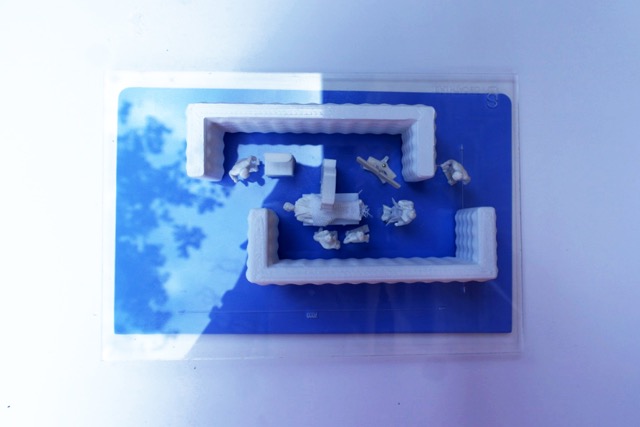Salome is one of our newest Makers in Residence, and she is working on quite a few exciting, groundbreakingly interdisciplinary projects. We chatted to find out more about what’s in store for her residency:
Can you tell us a bit about your background as a maker, your practice and areas of interest?
My background is in industrial design, though a lot of my professional work in the last two years has been in set design and lighting. My ‘expertise’, if I may say, was cultivated from the combination of both industrial design (sustainable long lasting projects) and theatre/events (abstract, though emotionally and physically engaging). I am now applying this expertise to healthcare research. More specifically, as a maker and designer, I’ve always had a very hands-on approach to my work, and thus started working at Machines Room to make up models or full scale prototypes to show clients and participants. I need to see things physically in front of me to make decisions! I am fascinated by the way simple object set ups and visual abstraction can recreate a scene and engage stakeholders.
Can you tell us a bit about what you’ve been working on, and what you will be working on, at Machines Room?
Thanks to my experience with set design, in parallel with a personal dance practice, I bring a very physical and sensory approach to each of my projects.
Over the last few years, amongst other projects for events and theatre, I have been working for Imperial College, designing an entire portable simulation set for cardiology training and education. Before I began my residency at Machines Room, I was already working here, making, testing ideas, failing, and refining a design for this set, which will eventually be commercialised.
What I am currently working on relates to Cellule, a collective I co-founded of freelance industrial designers dedicated to healthcare research and participatory projects. With the current state of the healthcare system, patients often find themselves surrounded by procedures, protocols and equipment, but can feel excluded from their own body and healing, and end up being passively processed through a complex system of care. During my residency at Machines Room, I will ideate projects as part of Cellule within the complex areas of addiction and sensory processing disorders by designing a set of tools for a participatory workshop with people around these themes. Cellule aims to bring a participative and physical approach to design which promotes people’s empowerment to be proactive agents in their own healing process.
Does having access to the machines, expertise and community at Machines Room influence your work and practice, if so then how?
Machines Room is a great facility for machines, but not only! I also get a lot from the community around it. The healthcare research domain is highly challenging and requires regular testing and monitoring, all within extremely tight budgets; I thus need to find inventive and affordable ways to make props and prototypes. While I am working on projects I will often invite other freelancers to join in and swap advice, whether relating to engineering or making, or simply to challenge concepts from their own perspective. I believe that great projects come from collaboration between disciplines, and Machines Room is a great hub of other inventive makers and lateral thinkers.
What are you finding most challenging?
As a designer, what I find the most challenging, and thus the most interesting, is to bring the various fields together and make sure everyone is involved in the decision making. By working with engineers, manufacturers, clinicians and researchers, I soon experienced how segmented and separated from each other the various fields and ‘experts’ actually were. Prototyping things at Machines Room allows me to engage and test ideas with clinicians and stakeholders jointly, while following a human-centred approach, and get immediate feedback. It saves me a lot of time too!
What is next for you? Are you planning to continue this stream of work or start a new project?
There are a couple of exciting things coming along – I’m not sure which one I should reveal! This residency is a great opportunity to promote existing methods and apply them to new proposals, such as the participatory workshop I mentioned earlier, and to attract further funding. In the long term, I am looking to build a sustainable process of work, through partnering with charities and health institutions. Machines Room is offering great support while I build up these partnerships.
Can you tell us a little about your background?
I obtained my MA Industrial Design at Central Saint Martins, and I am also a self-taught spatial designer. I have worked for established studios in set design, lighting and events, such as Esdevlin and Urban Electric.


